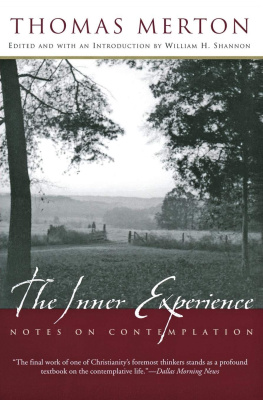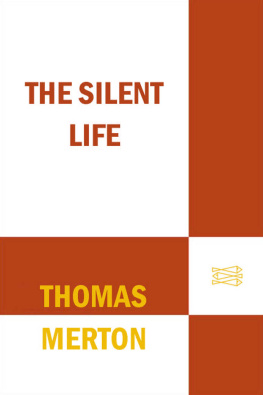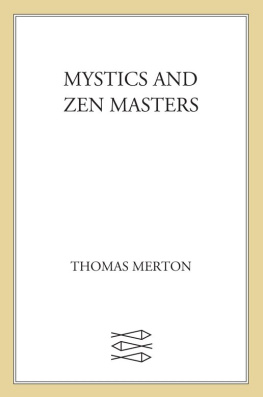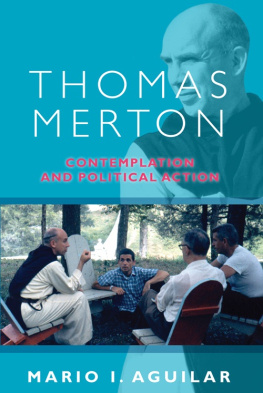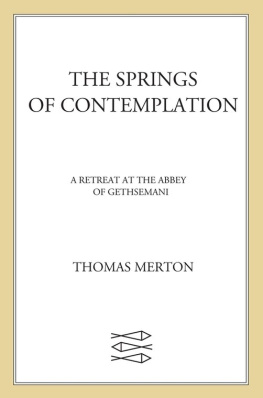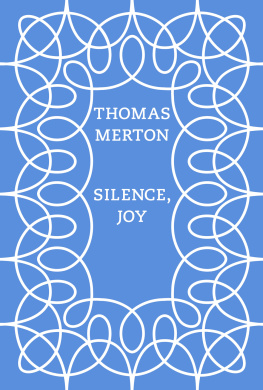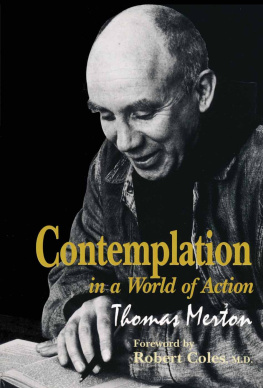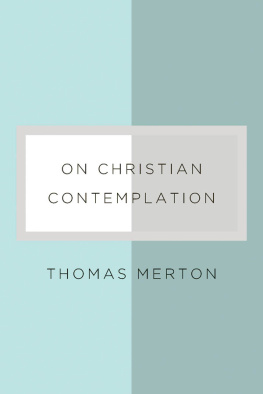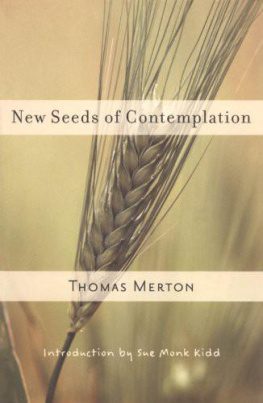The Inner Experience
Notes on Contemplation
THOMAS MERTON
Edited and with an Introduction by
WILLIAM H. SHANNON

Contents
What is contemplation? This question engaged Thomas Merton for most of his adult years. It was also the title of one of his earliest books. What Is Contemplation?, written for a student at St. Marys College, Notre Dame, Indiana, appeared the year in which Merton achieved fame and fortune through the publication of his best-selling autobiography, The Seven Storey Mountain (1948). What Is Contemplation? would rank quite low on anyones list of Mertons writings on the contemplative life. There was little about it that was unique. Practically everything in it could be found in almost any work on contemplation written in the first half of the twentieth century. It was not widely advertised and soon yielded place to a better work, Seeds of Contemplation, though it must be said that even this work was by no means his best on the subject.
Yet Merton never quite forgot this firstborn of his writings on contemplation. Eleven years after its original publication, in the summer of 1959, he decided to rewrite it. By the end of the summer, he had produced a longer and quite different work, though it still retained within it most of the original. He described it as a finished book, yet he added that it needed some revision. Such a statement raises some obvious questions. When he describes the book as finished but needing to be revised, was the revision he had in mind major or minor? Did he actually carry out this revision and, if so, when did he do it?
Evidence from Within the Merton Canon
On July 12, 1959, Merton recorded in his journal: This week I have been rewriting What Is Contemplation? and of course it has come out three times as long and is a completely different book. A lot of water has gone under the bridge, he tells us, since 1948, when he first wrote the earlier work. In that work his thoughts on contemplation were oversimplified. How mistaken I was to make contemplation only part of a mans life. For a contemplative his whole life is contemplation.
His journal entry for July 21, 1959, indicates that he had made a commitment to this project. Already he is expressing some misapprehensions about what he is writing: Rewriting What Is Contemplation? making too many cracks about large monasteries which are like factories.
It should be noted that the revision he is talking about at this point goes beyond What Is Contemplation? It is the revision of a new work that grew out of the revision of that earlier work. He is now revising The Inner Experience.
Six days after this entry, on September 12, 1959, writing to Czeslaw Milosz, he speaks about this respectable book. I have just been finishing another book, The Inner Experience. He summarizes the books contents for Milosz: [It offers] a wider deeper view of the same thing, contemplation, with more reference to Oriental ideas. There is to me nothing but this that counts, but everything can enter into it.
There is yet another reference to this newly completed book. On September 29, 1959, he was able to report to Sister Thrse: I finished a book this summer called The Inner Experience which started out to be a simple revision of What Is Contemplation but turned into something new, and just about full length. Although he stated that he had finished the book, he apparently felt that it needed some touching up. He goes on to say: It has to be revised and has been sitting here on the desk, waiting for revision for some time, but I refuse to work around the house as they are blasting around on all sides with jackhammers and other machines and it is impossible to think. The novices have been making a good share of this noise, trying to put in a couple of new showers in our crowded cellar. Presumably the new showers were installed and the jackhammers and machines eventually stopped their blasting, but neither the Merton Journals nor the Letters ever indicate that he got around to doing that revision.
In A Search for Solitude, the third volume of his Journals, under the date of September 29, 1959, the very day he had written to Sister Thrse, he again expresses a desire to revise it: My last mss. (The Inner Experience) lies on the desk untouched. I want to revise it.
On November 19, 1959a time when he was anticipating a favorable reply from Rome for a transfer to a place of greater solitudehe makes clear that, should this transfer take place, it would probably mean no more writing for him. Yet he hastens to add that there are still three works that need correcting and proofreading. He lists them: ( a ) The Essaysand Xstian Life of Prayer, ( b) Existential Communion, and ( c ) Inner Experience (?). It is not clear what ( a) refers to; ( b) was published in 1961 as The New Man. The question mark after Inner Experience is puzzling. Does it mean that he is no longer sure he wants to rewrite it?
Yet in the fifth volume of the Journals, Dancing in the Water of Life, under the date of August 26, 1963, he is still talking about revising it, though there is no proof that he did so at the time. Thus he writes: Tried to get some of my unfinished work together. With revision of several essays, etc. And revision of The Inner Experience.
This prohibition against publishing The Inner Experience strongly suggests that, at the time the Trust document was drawn up (in 1967), he simply had not done the revision he intended; or if he had, he was still not satisfied with it. This evidence supports, beyond any reasonable doubt, my conviction that the four extant drafts of The Inner Experience were written in 1959. No revision of the text was made until 1968, when brief (and hardly substantive) corrections and additions were made to draft 4. It is to this 1968 revision that I wish to turn now.
Evidence from Outside the Merton Canon
Is there any indication outside his own writings that would (1) suggest that he did do some revising of the manuscript, (2) tell when he did so, or (3) indicate that, such revisions having been made, Merton was open to the possibility of publishing said manuscript? It is my conviction that Daniel Walsh, Mertons philosophy teacher at Columbiawho had come to Louisville and been ordained a priest in the Louisville diocesehas provided answers to all three of these questions. Walsh did so in a letter he wrote to Father Flavian Burns on May 6, 1972. In this letter he tells Gethsemanis abbot that in 1968, shortly before he left for Asia, Merton paid a surprise visit to him at his office in Bellarmine College. Walsh was about to go across the road (Newburg Road) to give a talk on contemplation to the nuns at the Carmelite monastery. Merton made clear that his visit was a hasty one. He had come to give Walsh a present on the anniversary of his ordination. The date of this visit would have been somewhere near May 14, 1968, since Walsh had been ordained on that date the previous year. His anniversary gift was contained in a manila envelope that he handed to Walsh. Merton told him: [This] is something I wrote a long time ago, but [I wonder] what the response to it would be if it were published. I had previously decided against it [in the Merton Legacy Trust]. But recently I reread it and made some corrections and additions which you will note in this copy. He suggested that Walsh let the Carmelites read it and find out what they thought about it. When I get back we can discuss it.
Walsh delivered the manuscript to the Carmelites. They read it in their public reading sessions for a whole year. They loved it! Walsh wrote to Abbot Flavian.
The discussion Walsh and Merton were to have on Mertons return never took place, as on December 10, 1968, Mertons voice was forever stilled by his sudden, unexpected, accidentaland much lamenteddeath in Bangkok, Thailand.
Next page
